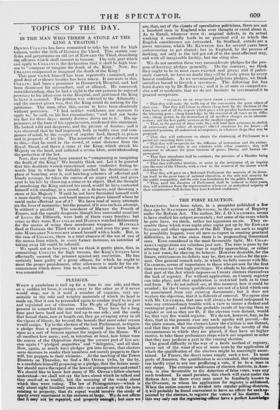PLEDGES.
WHEN a pendulum is tied up for a time to one side, and then on a sudden let loose, it swings away to the other as if it never would stop; nor is it until a number of vagaries, very un- suitable to the cold and weighty materials cf which its head is made up, that it can be persuaded again to confine itself to its just and regulated are of vibration. The Pe:ple of England are at present in somewhat the same condition. They have for a how time past been hard and fast tied up to one side; and the cords that bound them, now at length cut, they go swinging away in all the vigour of liberty, far beyond the bounds that mere sober reason would assign. Up to the election of the last Parliament, to fequire a pledge from a prospective member, would have been looked upon as a sort of treason against the majesty of the House. We all recollect how many, and', in intention at least, how bitter were the sneers of the Opposition during the greater part of' last ses- sion again-t ‘.‘ pledged majorities" and "delegates," and all that. Now, again, so much have pledges got into favour, that electors seem desirous to render their members not merely puppets to their Will, but puppets to their whimsies. At the meeting of' the Tower Hamlets on Thursday, we find a Mr. OFFER (who, by the by, is a candidate himself) proposing as a pledge, that the future mem- ber should move the repeal of the laws of primogeniture and entail ! We should like to know how many of Mr. OFFER'S fellow-electors understood—we shall not say the laws about which he talked and they resolved so. readily,. but the meaning of the words about which they were voting.' The law of Primogeniture—Which is only Ubeut. eight -hundred years old—is So Mixed .up With the laws, relating to property; that-its. repeal would involve the study of ticur1y.every enactment in the statutes Wargo. WOO not affirm*.•Oat May bOepealed, and properlY ono**. btit sure we., are, that, out of the closets of' speculative politicians, there are not a hundred men in England who ever thought or cared about it. As to Entail, whatever were it original defects, in its actual working it assuredly leads to no practical evil in which the English constituency are interested. In Scotland, entails are a gross nuisance, which Mr. KENNEDY has for several years been endeavouring to get abated ; but in England, by the process of docking, not only is the tail got rid of in the most effectual way, and with all imaginable facility, but the sting also.
We do not mention these very inconsiderate pledges for the pur- pose of decrying pledges generally. On the conttary, we think they ought to be in most cases exacted and given; and if judici- ously exacted, we have no doubt they %% ill be fecely given by every honest candidate. As we recommend judicious pledges, we think ourselves bound to furnish a specimen. The following list has been drawn up by Dr. BOWRI NG ; and it is at once so comprelea- sive and so moderate, that we do not hesitate to leccmmend it to general acceptance.
44 PLEDGES TO BE nEwinEn FROM CANDIDATES.
" That they will make the walhing of the community the great object of their care. That they will labour to obtain cheap food, by the abolition of the Corn, laws, and of all the imposts which press with peculiar bUTIleDSOMCDRFS Od the labouring justice, ; cheap knowledge, by the removal of all taxes on its diffu- sion ; cheap by the destruction of all needless charges on its adminis- tration ; and the best public services at the smallest expense.
" That, in the pursuit of these ends, they will lend their assistance to abolish all unnecessary and reduce all overpai I taficial situations for the future—all unmerited pensions, all undeserved recompenses, in whatever shape they may be proposed.
" That they will endeavour to obtain the shortening of Parliament to a period not exceeding three yews.
" That they will co-operate for the diffusion of instruction and the extinc- tion of slavery and that, in our relations with other countries,, they will endeavour to advance the great interests of peace, liberty, and human im- provement. " That their attendance shall be constant ; the presence of a Member being essential to his usefulness.
" That they will either institute, or assist in the institution of, an inquiry into the state of the Church, with a view to the removal of the abuses which dishonour it.
" That they will press on a Reformed Parliament the necessity of its devot- ing itself to the great topic of national education, as the only real security for the public tranquillity, and the only true foundation for the public happiness. " That, until the duration of Parliament shall be reduced to three years, they will withdraw from the representation whenever an undoubted majority of their constituents shall declare they have forfeited confidence."


























 Previous page
Previous page